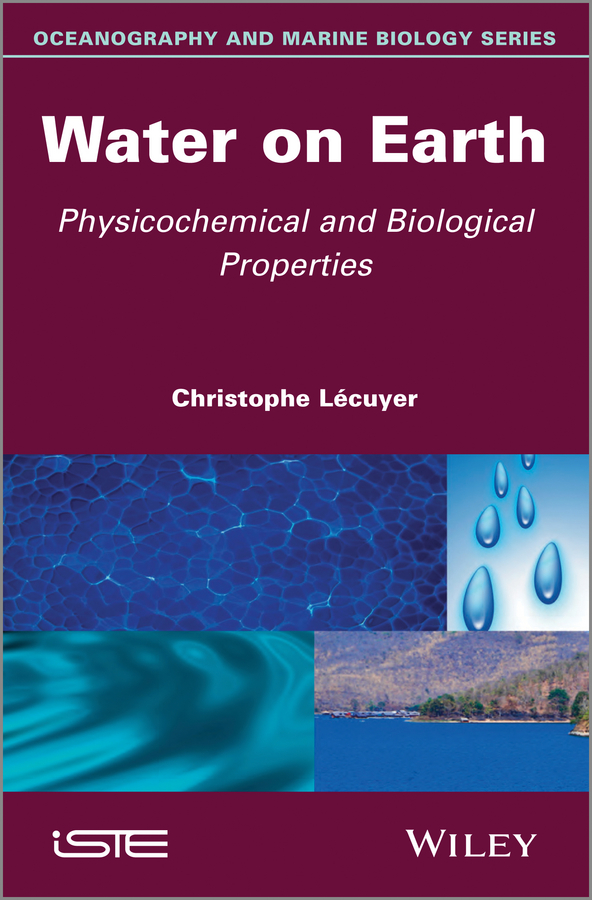Электронная книга: Christophe Lécuyer «Water on Earth. Physicochemical and Biological Properties»

|
The presence of water on Earth is discussed in this book using various theories about its origin as a basis. These theories include a massive degassing of the primitive parent bodies that built our planet as well as a late addition from comets that collided with the Earth’s surface. The extraordinary physico-chemical properties of the water molecules, combined with its abundance and distribution over the Earth’s surface, have contributed to regulating the global climate and favoring species’ evolution for more than 4 billion years. The early emergence of lifein the deep ocean and its further diversification were closely linked to the global water cycle whose dynamics result from the energy balance between solar radiation and the internal heat flux of the Earth. Chapter 1 of this book deals with the extraordinary physico-chemical properties of the watermolecule while Chapter 2 provides insight on theories regarding the origin of water on Earth. In the third chapter, the author focuses on the chemical composition of the main water reservoirs of our planet. Chapters 4 and 5 discuss water’s relationship with plate tectonics and life, respectively.The sixth and final chapter uses stable isotope tracking to look into the water cycle and past climates. Contents 1. Water: A Molecule Endowed with Extraordinary Physicochemical Properties. 2. Theories about the Origin of Water on Earth. 3. The Main Water Reservoirs on Earth and their Chemical Composition. 4. Water and Plate Tectonics. 5. Water and Life. 6. Stable Isotope Tracking: Water Cycles and Climates of the Past. The presence of water on Earth is discussed on the basis of the various theories about its origin such as a massive degassing of the primitive parent bodies that built our planet as well as a late addition from comets that collided with its surface. The extraordinary physico-chemical properties of the water molecule combined with its abundance and distribution over the Earth’s surface have contributed to regulating the global climate and favoring the evolution of species for more than 4 billion years. The early emergence of life in the deep ocean and its further diversification were closely linked to the global water cycle whose dynamics result from the energy balance between solar radiation and the internal heat flux of the Earth. Издательство: "John Wiley&Sons Limited"
ISBN: 9781118575321 электронная книга Купить за 11968.57 руб и скачать на Litres |
Другие книги схожей тематики:
| Автор | Книга | Описание | Год | Цена | Тип книги |
|---|
См. также в других словарях:
inland water ecosystem — ▪ biology Introduction complex of living organisms in free water on continental landmasses. Inland waters represent parts of the biosphere within which marked biological diversity, complex biogeochemical pathways, and an array of… … Universalium
Microbial enhanced oil recovery — (MEOR) is a biological based technology consisting in manipulating function or structure, or both, of microbial environments existing in oil reservoirs. The ultimate aim of MEOR is to improve the recovery of oil entrapped in porous media while… … Wikipedia
protein — proteinaceous /proh tee nay sheuhs, tee i nay /, proteinic, proteinous, adj. /proh teen, tee in/, n. 1. Biochem. any of numerous, highly varied organic molecules constituting a large portion of the mass of every life form and necessary in the… … Universalium
environmental works — ▪ civil engineering Introduction infrastructure that provides cities and towns with water supply, waste disposal, and pollution control services. They include extensive networks of reservoirs, pipelines, treatment systems, pumping stations … Universalium
sedimentary rock — Rock formed at or near the Earth s surface by the accumulation and lithification of fragments of preexisting rocks or by precipitation from solution at normal surface temperatures. Sedimentary rocks can be formed only where sediments are… … Universalium
science, history of — Introduction the history of science from its beginnings in prehistoric times to the 20th century. On the simplest level, science is knowledge of the world of nature. There are many regularities in nature that mankind has had to… … Universalium
